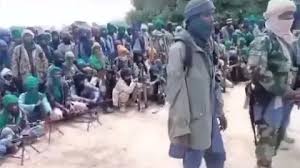Security
23 LGAs battling insecurity in Sokoto, Zamfara, Kebbi

Residents of at least 23 Local Government Areas, LGAs, in Sokoto, Zamfara and Kebbi States are battling to survive as kidnappers, cattle rustlers and bandits make life difficult for them.
A check by the News Agency of Nigeria indicates that residents of the affected areas have either been forced to migrate, enter into agreement with the criminals or live a life of uncertainty.

In Sokoto State, residents said local government areas worst affected are Isa, Sabon Birni, Gwadabawa, Illela, Tangaza, and Goronyo.
NAN gathered that residents had been forced to abandon their farms, while some villages had been deserted across the affected LGAs.
Abubakar Bawa, the spokesman for Gov.Ahmed Aliyu, said that the state government was aware of the enormity of the situation.
“We are giving priority to ensuring a safe environment. Addressing security challenges has remained top on our administration’s nine-point agenda.
“Our target as a government is to ensure that citizens sleep with their two eyes close and continue to live and relate peacefully with one another,” he said.
He assured that the Nigerian Army, Police and other security agencies have been sustaining efforts to secure the areas.
The governor’s spokesman said the government would continue to provide all necessary support for the security agencies to address the challenges.
Also, spokesman of the Police Command in Sokoto State, ASP Ahmad Rufai, said the Commissioner of Police, Mr Ali Kaigama, has been engaging residents to facilitate the flow of actionable information to address banditry and other criminalities.
He said the command had adopted measures, deployed personnel and materials and have been collaborating with other security agencies to end banditry and other criminalities in the state.
The police spokesman said local governments in eastern parts of Sokoto state were mostly affected by the security challenges.
In Zamfara, a civil society activist, Mr Faruk Shehu, said many communities in the 14 LGAs of the state have been displaced, with residents of Maru, Anka, Shinkafi, Maradun, Zurmi, Gusau and Bungudu LGAs, worst affected.
He said that previous attempts at dialogue with the bandits had failed, resulting to the escalation of the security challenges in the state.
“The security challenges in the state started as cattle rustling and later transformed into banditry and kidnapping,” Mr Shehu said.
He expressed the hope that the ongoing engagement by Gov Dauda Lawal with the military and other security agencies would lead to escalation of attacks on the bandits to secure the areas they have dominated.
Already, the state government has been emphatic that there will be no peace deal with the bandits.This was emphasised by the secretary to the state government, Abubakar Nakwada, who said the government will never dialogue with the bandits as done by previous administrations.
Mr Nakwada added that the state governor would support security agencies and community groups to bring the criminals to their knees.
The situation in Kebbi has already claimed the lives of at least 2,500 people between 2019 and 2023, according to Bamaiyi An’iko, the Secretary of Zuru Development Foundation.
Mr An’iko said that the 2,500 people were killed in Danko, Wasagu, Fakai, Sakaba and Zuru LGAs, all under Zuru Emirate.
He said bandits have been attacking and displacing rural communities in the emirate, adding that some communities around Bena, Danko, Wasagu had come under siege or total control of the bandits.
“Some communities had to sign agreement with the bandits,” the foundation secretary said.
”There are a lot of Internally Displaced Persons requiring urgent provision of relief materials, including food and toiletries, clothes and mats.”
He urged the state government and other agencies not to relent in providing relief assistance to the IDPs.
Mr An’iko commended the efforts of the military, police and other security agencies working to restore peace in Kebbi.
The deputy governor of the state, Umar Tafida, assured that the government was determined to end the security challenges.
Mr Tafida also said the government would continue to provide support for victims of bandits’ attacks who have been forced to leave their homes.
According to him, the government is worried over the recurring banditry attacks which have led to loss of lives, destruction of properties, and having negative impact on farming activities.
“The state government under the leadership of Dr Nasir Idris, will leave no stone unturned in making sure that banditry comes to an end in the state.
”Communities should assist security agencies with credible intelligence information to fish out the bandits in order to bring them to justice,” the deputy governor added.
He warned that the government would deal decisively with informants or anyone caught conniving with bandits.
Also, Ahmad Idris, spokesman for the governor, said apart from Zuru Emirate, the government had deployed troops to three local government areas under Yauri Emirate also facing challenges from bandits.
“The government is doing its best to ensure that the situation is fully tackled,” he added.
A community leader, Sani Umar-Jabbi, said there was need to prioritise community engagement in tackling security challenges in the country.
He said that apart from attitudinal change among Nigerians, the country should come up with a policy to stem population growth.
Mr Umar-Jabbi, who is the District Head of Gagi in Sokoto State, said that unplanned population has contributed to the escalation of crisis due to shrinking farmlands, grazing areas and other natural resources.
NAN

























